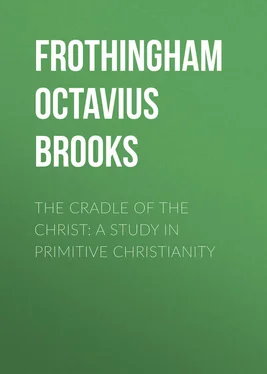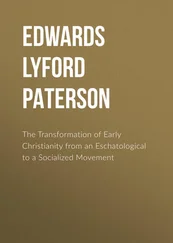But while all Pharisees shared the same general beliefs, all were not of the same mind on questions of immediate policy. They were divided into conservative and radical wings. The conservatives, whether from temperament, position, conviction, or selfish interest, deprecated sudden or violent measures which would defeat their own ends and make a bad state of things worse. They counselled moderation, patience, acquiescence in the actual and inevitable. They discountenanced the open expressions of discontent, advised submission to law, and preached the duty of strict religious observance as the proper preparation, on their part, for the providential advent of the Son of Man. No doubt this policy was prompted in many cases by timidity, and in many cases by time-serving craft; but no doubt it was in many cases suggested by sober statesmanship. The conservative Pharisee was even less popular than the Sadducee; for the Sadducee pretended to no belief in Israel's providential destiny, and to no sympathy with Israel's Messianic hope; while the Pharisee made conspicuous protestation of orthodox zeal. Evidence of the popular dislike of the conservative Pharisee abounds. He was looked upon as a renegade. He was called pretender and hypocrite, wolf in sheep's clothing, a whited sepulchre. He was ridiculed and lampooned. All manner of heartlessness was charged against him, as being a monster of inhumanity. "The Talmud," says Deutsch, "inveighs even more bitterly and caustically than the New Testament, against what it calls 'the plague of Pharisaism;' 'the dyed ones,' 'who do evil deeds, like Zimri, and require a goodly reward, like Phinehas;' 'who preach beautifully, but behave unbeautifully.'" Their artificial interpretations, their divisions and sub-divisions, their attitudes and posturings were parodied and caricatured. The conventional Pharisee was classed under one of six categories: he did the will of God, but from interested motives; he was forever doing the will of God, but never accomplishing it; he performed absurd penances to avoid imaginary sins; he accepted office in the character of saint; he sanctimoniously begged his neighbor to mention some duty he had inadvertently omitted, his design being to seem faithful in all things when he was faithful in nothing; or, if sincerely devout, he was devout from fear. He had no credit given him for his virtues, and more than due discredit for his vices. In time of peril the conservatives out-numbered the radicals, for radicalism was dangerous; and the feeling between the two classes was the bitterer on this account; the conservatives hating the radicals whom they could not disown, the radicals despising the conservatives who were their brothers in faith. Each party compromised the other precisely where misapprehension was most exasperating.
For the radicalism of the time was exclusively, we may say, pharisaic. There was no other of any considerable account. None but believers in the restoration of Israel, in the triumphant vindication of her faith in a new and complete social order and in absolute political independence; none but believers in divine interposition, and a personal resurrection of the faithful for the enjoyment of felicity in the Messianic kingdom; none but devout students of the scripture, recipients of the whole tradition, visionaries of the literal or spiritual order, could entertain so audacious a hope; and all these were Pharisees.
The Essenes, a mystical and secluded sect, dwelt apart, took no interest in public affairs, and exerted no influence on public opinion. Peculiar in their usages, secret in their proceedings, contemplative in their habits, quietists and dreamers, they so transfigured and sublimated the views which they shared with their compatriots, that no point of practical contact was visible. From them no prophet or reformer came. The soul of the Hebrew faith was all they recognized; the body of it they were indifferent to. That in many respects their doctrines, precepts, social usages and religious practices corresponded with those held by conscientious Jews, need not be questioned. It does not follow that they originated or communicated them. Such opinions were simply adopted as a common inheritance. The Essenes rather withdrew than imparted their belief. All the ingenuity of DeQuincey is unavailing to establish a practical relation between the Essenes and any popular movement in Judæa. These movements were led by the more enthusiastic of the Pharisees, and followed by the multitude that shared their ideas.
The "lawyers" and "scribes," Pharisees for the most part by profession, were in consequence of their profession, conservative. Men of learning, well balanced in mind, carefully educated, good linguists, masters often in theology, philosophy, moral science, familiar as any were with natural history, the mathematics, botany, engaged in the study and exposition of the sacred books, they were from the scholastic nature of their pursuits, disinclined to take part in popular reforms. There were no zealots among them; they were men of moderate opinions and calm tempers, capable of stubborn resistance to the elements of agitation, but incapable of vehement sympathies with enthusiasm.
Конец ознакомительного фрагмента.
Текст предоставлен ООО «ЛитРес».
Прочитайте эту книгу целиком, купив полную легальную версию на ЛитРес.
Безопасно оплатить книгу можно банковской картой Visa, MasterCard, Maestro, со счета мобильного телефона, с платежного терминала, в салоне МТС или Связной, через PayPal, WebMoney, Яндекс.Деньги, QIWI Кошелек, бонусными картами или другим удобным Вам способом.











![Anne Blunt - A Pilgrimage to Nejd, the Cradle of the Arab Race. Vol. 1 [of 2]](/books/749489/anne-blunt-a-pilgrimage-to-nejd-the-cradle-of-the-thumb.webp)
![Anne Blunt - A Pilgrimage to Nejd, the Cradle of the Arab Race. Vol. 2 [of 2]](/books/750183/anne-blunt-a-pilgrimage-to-nejd-the-cradle-of-the-thumb.webp)